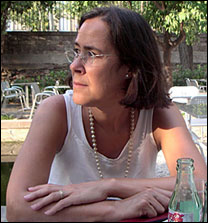No moment in history has brought together the three Abrahamic communities—Islam, Christianity, and Judaism—for as long or as intimately as the 700-odd years we refer to as "medieval Spain." What can we learn today from this shared culture which often managed to trump religious ideology and conflict?
Born in Cuba and raised in Philadelphia, María Rosa Menocal received her Ph.D. in Romance Philology from the University of Pennsylvania. Before joining Yale, where she is now the R. Selden Rose Professor of Spanish and Portuguese and director of the Whitney Humanities Center, she taught at Penn and Bryn Mawr College. While at Penn, she also served as editor of the journal Hispanic Review and as acting director of the Center for Italian Studies.
Author of the critically acclaimed Shards of Love: Exile and the Origins of the Lyric (Duke University Press, 1994), a provocative treatment of the origins of European lyric poetry, Professor Menocal has published widely in the field of medieval literature and culture. Among her other works are The Arabic Role in Medieval Literary History: A Forgotten Heritage (University of Pennsylvania Press, 2003), and Writing in Dante's Cult of Truth from Borges to Boccaccio (Duke, 1991).
Noted medievalist María Rosa Menocal's recent book The Ornament of the World: How Muslims, Jews, and Christians Created a Culture of Tolerance in Medieval Spain (Little, Brown and Company, 2002) has been widely hailed as an entralling revelation of a "lost" golden age. When asked how she came to write this book, she replied, "...the medieval period has been, and continues to be, so grossly misrepresented in almost all of our histories—from the fact that we have so little knowledge that medieval European culture included, centrally, the study of Greek philosophy as it was interpreted by hundreds of years of Muslim and Jewish commentaries to the fact that we still use the word medieval to mean 'dark' and 'unenlightened' when, in some respects, Europe has never been as enlightened since as it was then." (Ornament of the World, Reading Group Guide, 2003).



